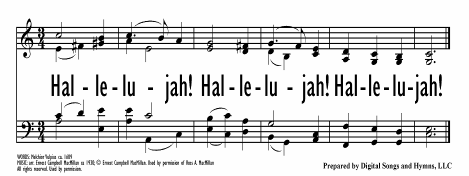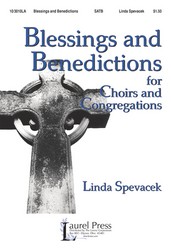- |
User Links
Alleluia (Duncan)
Hymn Information
- First Line
- Alleluia! Alleluia!
- Text Source
- Traditional
- Tune Name
- ALLELUIA DUNCAN
- Composer
- Norah Duncan IV
- Topic
- Responses: To Prayer · Short refrains · Elements of Worship: Praise and Adoration
Copyright Information
- Text Copyright
- Public Domain
- Tune Copyright
- © 1987 GIA Publications, Inc.
- Reprint/Projection Information
- Words and Music: Permitted with a license from OneLicense.net. If you do not own this license, please contact the copyright holder for permission.
Full Text
Scripture References
Further Reflections on Scripture References
This word, as a call to praise God, is found often in the Psalms (see Psalms 103-106) but most notably in Psalms 146 – 150.
Confessions and Statements of Faith References
Further Reflections on Confessions and Statements of Faith References
Sometimes the soul of the Christian needs to cry out exuberantly with joy, thanks, and adoration, even without identifying the reasons for such praise and adoration. Moreover, Christians who gather corporately find it fitting to do so as the grateful body of Christ. The Confessions of the church recognize this natural expression. Belgic Confession, Article 1 sees God as the “overflowing source of all good,” and such a realization deserves an “Alleluia!” Heidelberg Catechism, Lord’s Day 1, Question and Answer 2 is a reminder that living in the joy of our comfort involves a spirit of thanks for his deliverance. In the same spirit, Our World Belongs to God, paragraph 2 exclaims, “God is King: Let the earth be glad! Christ is victor: his rule has begun! The Spirit is at work: creation is renewed!” and then as a natural response cries: “Hallelujah! Praise the Lord!”
Alleluia (Duncan)
Introductory/Framing Text
Duncan received an undergraduate degree (English Literature) from the University of Detroit, a Master of Fine Arts degree (Organ Performance) from Wayne State University, and a Doctor of Musical Arts (Church Music/Organ Performance) degree from the University of Michigan.
Duncan received an undergraduate degree (English Literature) from the University of Detroit, a Master of Fine Arts degree (Organ Performance) from Wayne State University, and a Doctor of Musical Arts (Church Music/Organ Performance) degree from the University of Michigan.


 My Starred Hymns
My Starred Hymns






